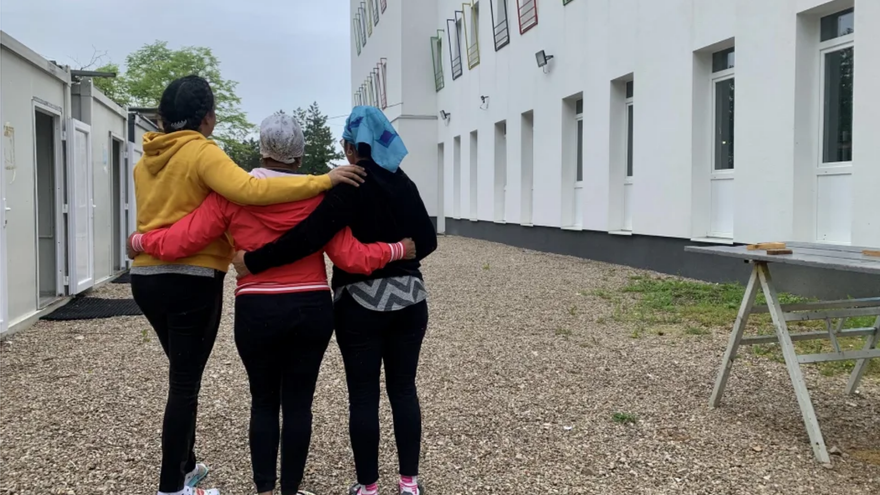
![]() EFE (via 14ymedio), Nedim Hasic, Sarajevo, 6 June 2023 — Carolina is a 50-year-old Cuban who for a long time lived between the dilemma of remaining in poverty or trying to emigrate to Europe. Today she is stranded in the far west of Bosnia-Herzegovina, a few kilometers from the border with Croatia and the EU.
EFE (via 14ymedio), Nedim Hasic, Sarajevo, 6 June 2023 — Carolina is a 50-year-old Cuban who for a long time lived between the dilemma of remaining in poverty or trying to emigrate to Europe. Today she is stranded in the far west of Bosnia-Herzegovina, a few kilometers from the border with Croatia and the EU.
“It was my husband who made the decision for us. To go to a place where we can work and earn more, not just survive,” she tells EFE at the reception center for refugees in the town of Borici.
She did not want to reveal her real name or surname, fearing for the safety of their daughter and three grandchildren who have stayed in Cuba.
Carolina and her husband, like dozens of other Cubans in Bosnia, dream of being able to enter Croatia, a country that is part of the Schengen zone of free community movement. In this way, they hope to be able to arrive in Spain one day, “because of the language,” the desired destination for many Cubans.
“In Cuba I worked wherever I could. I am a seamstress by profession. I sewed clothes in my house and also worked in a factory where work clothes were made,” says Carolina.
They arrived in Bosnia from neighboring Serbia, where they entered when Cubans still did not need a visa. They stayed there for eight months but, in the end, decided to continue on the road to the EU.
Her compatriot Maria (another fictitious name) is a physics teacher. At 43 she is the mother of two children ages 18 and 19, who stayed in Cuba.
Together with her husband, she left the Island due to the poor economic situation of the family. “We had no other choice. We simply couldn’t live with the money we brought home; it didn’t even cover our elementary needs,” she recalls.
Both Carolina’s and María’s husbands refused to talk to EFE.
In the Bosnian Office for Foreign Affairs, EFE was told that in the Borici reception center, of the 1,620 migrants registered so far this year, 713 are citizens of Cuba, including 346 women and 97 children, and the rest are mostly Afghans.
In the center of Lipa, located in the same western area but intended only for adult men, 3,253 migrants were registered this year, most of them Afghans and Moroccans, as well as 114 Cubans.
Refugees arrive in Bosnia-Herzegovina by bus or taxi, or even crossing the Drina River by boat, Cubans say. Some traveled first to Russia, Cuba’s main ally, and from there to Belarus, Turkey and finally to Serbia.
The Cubans of Borici are afraid because they receive news about “hot returns” of migrants from Croatia, or about problems with clandestine boats to cross the border River Sava.
When they enter Bosnia-Herzegovina, Cubans announce their desire to seek asylum, which allows them a month to leave since they don’t want to stay in that country, one of the poorest in Europe.
Thirty years ago, Bosnia was the scene of the bloodiest of the civil wars in the former Yugoslavia, with about 100,000 dead and hundreds of thousands injured and displaced.
The Cubans interviewed by EFE point out that it was very difficult to decide to leave their country and leave for an unknown world. The key factor was confidence in a better future.
“It is said in the world that health care in Cuba is excellent. We don’t see it that way; in the end we have to pay for everything with our money,” says Valeria, another Cuban from Borici.
“Donations arrive in Cuba from abroad, but we do not see that they are invested in infrastructure or schools, nor do we know where the money goes,” says this woman, who wants to get to Germany, where she has relatives.
In Bosnia-Herzegovina, located on the so-called “Balkan route” of refugees, there are currently about 850 immigrants in reception centers, most of them from Afghanistan, according to data from the International Organization for Migration.
However, the local press estimates that so far this year, more than 7,000 immigrants have passed through the Balkan country, dreaming of reaching the EU.
Translated by Regina Anavy
____________
COLLABORATE WITH OUR WORK: The 14ymedio team is committed to practicing serious journalism that reflects Cuba’s reality in all its depth. Thank you for joining us on this long journey. We invite you to continue supporting us by becoming a member of 14ymedio now. Together we can continue transforming journalism in Cuba.
